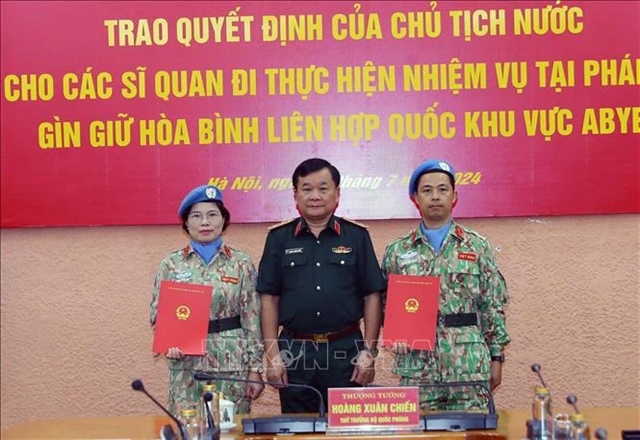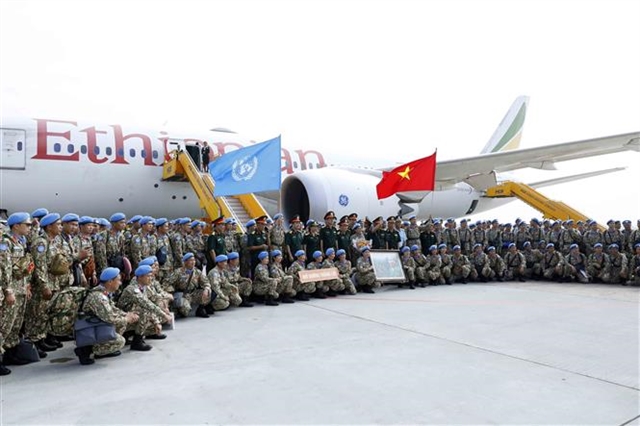 Politics & Law
Politics & Law

 |
| Engineering Unit Rotation 2 departs for their peacekeeping mission with the United Nations Interim Security Force for Abyei (UNISFA) on August 8, 2023. VNA/VNS Photo |
HÀ NỘI — The Việt Nam Department of Peacekeeping Operations (VDPO) under the Ministry of Defence on Wednesday inaugurated a pre-deployment training and field exercise course for Engineering Unit Rotation 3 and Level 2 Field Hospital Rotation 6, who will participate in United Nations peacekeeping operations in 2024.
The training and exercise, led by Major General Phạm Mạnh Thắng, the VDPO’s director, aims to equip personnel from both units with fundamental knowledge of UN peacekeeping operations, essential skills for mission execution and to enhance their capabilities according to standard operational procedures. It will also update them on the operational area and prepare them comprehensively for deployment.
This course also provides an opportunity to assess the overall capabilities of Engineering Unit Rotation 3 and Level 2 Field Hospital Rotation 6 to ensure they meet the requirements for their missions before deploying to the UN Interim Security Force for Abyei (UNISFA) and the UN Mission in South Sudan (UNMISS).
Running from August 1 to September 14, the training and exercise will involve 198 trainees from Engineering Unit Rotation 3 and 70 trainees from Level 2 Field Hospital Rotation 6, along with instructors and training staff from various military units.
Notably, this session will include instructions from a technical expert from the European Union and an observation and support team from the United Kingdom.
The training and exercise are divided into five periods, including training based on UN materials, training for specific mission tasks at the mission site, training on the regulations, policies and procedures of the Việt Nam People's Army, supplementary skills training for various units and field exercises.
Participants will be updated on general knowledge of UN peacekeeping operations and Việt Nam's contributions to these efforts, including peace and security activities, legal bases, operational mechanisms and unified actions within peacekeeping. They will also learn about the UN Security Council’s mandates and the mission’s partner organisations.
In the second period, participants will gain insights into the UN Security Council’s mandates, peacebuilding activities, human rights protection, women, peace and security issues, civilian protection, preventing sexual violence and exploitation in conflicts and child protection.
The third period will focus on UN peacekeeping regulations, with instructors covering topics such as core values, competencies, ethics and discipline of UN personnel, respecting diversity in peacekeeping operations, preventing exploitation and sexual abuse, protecting natural resources and the environment, ensuring security and safety for UN personnel, personal security awareness, medical care for UN staff, stress management and frontline medical support.
During the field exercise period, Engineering Unit Rotation 3 will conduct a command and staff exercise with partial live drills. Level 2 Field Hospital Rotation 6 will perform a functional exercise of its field hospital operations using a scenario-based situation.
Lieutenant Colonel Fabien Evesque, EU technical expert at the VDPO, affirmed that the training and exercise will provide the essential knowledge needed for effective participation in UN peacekeeping operations.
Trainees will learn about the UN, its operational mechanisms and relevant organisations and individuals. They will also explore various missions and tasks in peacekeeping, with a particular focus on understanding the values, principles and codes of conduct expected of UN representatives, he added.
To ensure the highest quality and effectiveness of the training and exercise, Thắng asked instructors to update and review new knowledge and changes in mission protocols, conduct practical training closely aligned with mission requirements and provide detailed feedback and assessments after each lesson for each trainee and unit. — VNS




